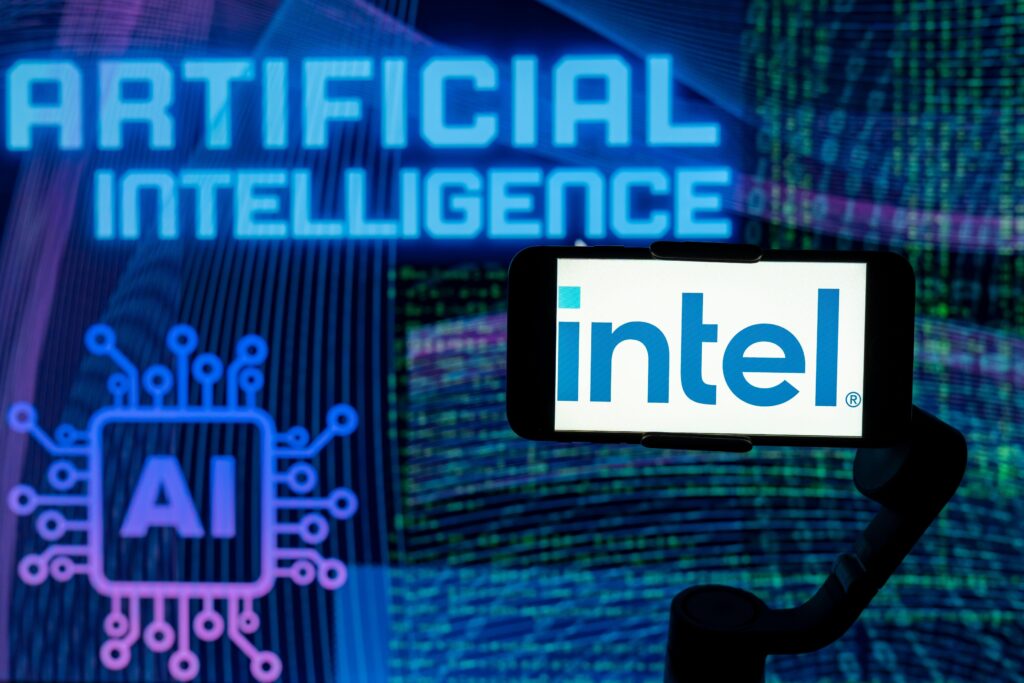
U.S. chipmaker Intel has unveiled a new PC processor that helps users enjoy various artificial intelligence services in their PCs. Intel has changed its processor design structure for the first time in 40 years to introduce the processor. It is also the first product to introduce advanced three-dimensional (3D) packaging technology in earnest. Samsung Electronics and LG Electronics, which are planning to supply PCs for AI, have also introduced new laptop computers in line with the release of Intel processors.
Intel held a press conference on “AI Everywhere” at the Federation of Korean Industries in Yeouido, Seoul on Wednesday, and introduced “Intel Core Ultra Processor” and “5th Generation Intel Xeon Processor (code name: Emerald Rapids).” Core Ultra Processor is for laptops, while 5th Generation Xeon Processor is a new product for data centers.
“Intel wants to make users more accessible and easy to use in all workloads from clients to edge, network, cloud, and data centers,” said Kwon Myung-sook, president of Intel Korea. “Intel wants to provide various hardware to this end and expand customer choices.”
In order to maximize AI performance in PCs, Intel has installed high-performance central processing units (CPU), graphics processing units (GPU) and neural network processing units (NPU). In the process, Intel also applied Poveros, a 3D advanced packaging technology that stacks chips vertically. The company explains that this enables not only Generative AI but also on-device AI, which enjoys AI service in devices without Internet connection.
“Since this generation, processors have become tiled and several chips have been attached,” said Choi Won-hyuk, managing director of Intel Korea. “It was not easy to put all technologies into one processor, but as a result of fundamentally changing the design in 40 years, we have achieved both tasks: performance and power efficiency.”
Intel predicted that the launch of the Core Ultra processor will serve as an opportunity to open up the AI PC market. It also explained that some 230 laptop and PC models that will be released in the global market next year will be equipped with Core Ultra processors. According to Boston Consulting Group, AI PCs are expected to account for 80 percent of the global PC market by 2028.
Samsung Electronics and LG Electronics each introduced new laptops with Core Ultra processors on Wednesday to respond quickly to the demand in the market. Executives in charge of related tasks, including Lee Min-chul, Samsung Electronics’ managing director, and Gong Hyuk-joon, LG Electronics, attended the Intel meeting and introduced the laptops themselves.
In the memory industry, attention is being paid to the 5th generation Zeon processor introduced by Intel. Zeon processor is Intel’s processor brand for data centers. After introducing the 4th generation Zeon processor in January, Intel released the 5th generation Zeon processor earlier than originally planned. It has improved computing and reasoning performance compared to the previous generation.
For a processor to function properly, memory must support it. The 5th generation heating processor supports double data rate (DDR), the latest DRAM specification. It is different from the 4th generation heating processor that supports both the previous DDR4 and DDR5 DRAMs. The more 5th generation heating processors are sold, the faster demand for high value-added and latest D-RAM will increase.
“The 4th generation Zeon processor already exceeded 1 million sales in August, and we are now expecting to sell 2 million,” said Na Seung-joo, managing director of Intel Korea. “The 5th generation Zeon processor will affect the demand for DDR5 because it will be steeper.”
Samsung Electronics plans to introduce innovative memory products in cooperation with Intel. “We were able to introduce AI that could not be implemented in the past through collaboration with high-performance and high-capacity memory,” Bae Yong-cheol, vice president of memory business at Samsung Electronics, said at the meeting. “We will continue to introduce innovative memory solutions that will lead on-device AI.”
Meanwhile, Intel is planning to introduce the next-generation AI accelerator “Gowdy 3” in the first half of next year in the process of increasing its product line for AI. Intel CEO Pat Gelsinger introduced the Gaudi 3 prototype at his company’s event held in the U.S. on the 14th (local time).
SALLY LEE
ASIA JOURNAL



